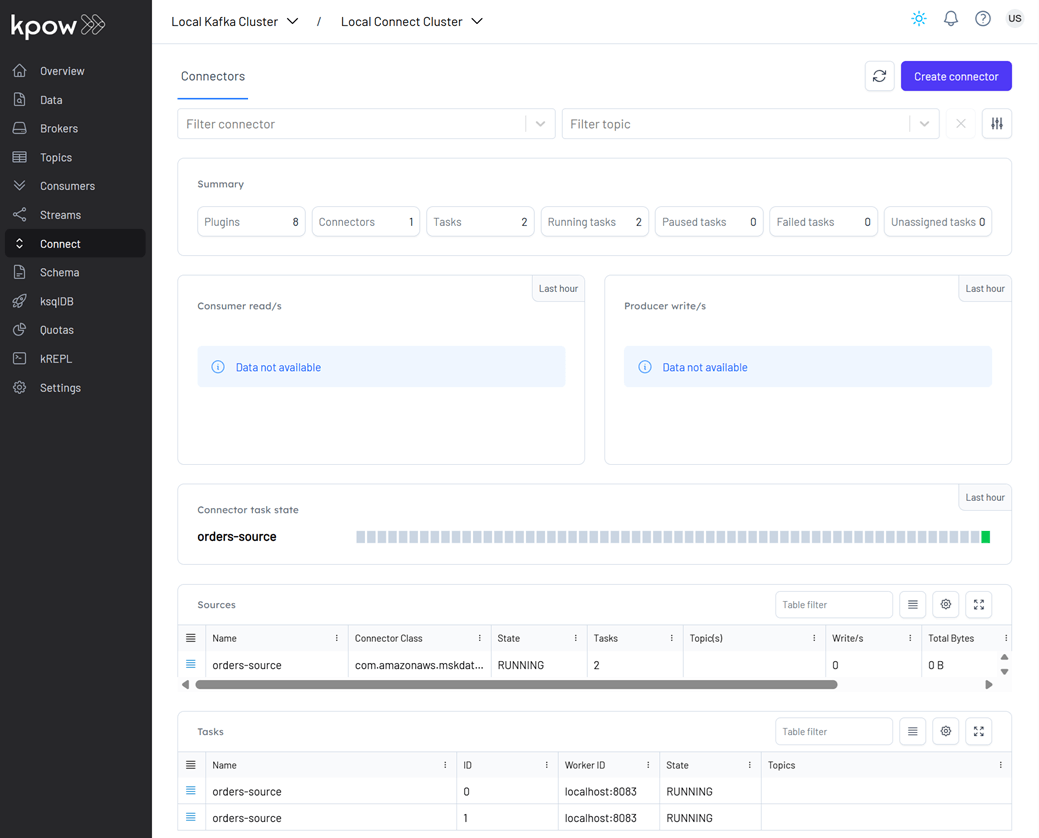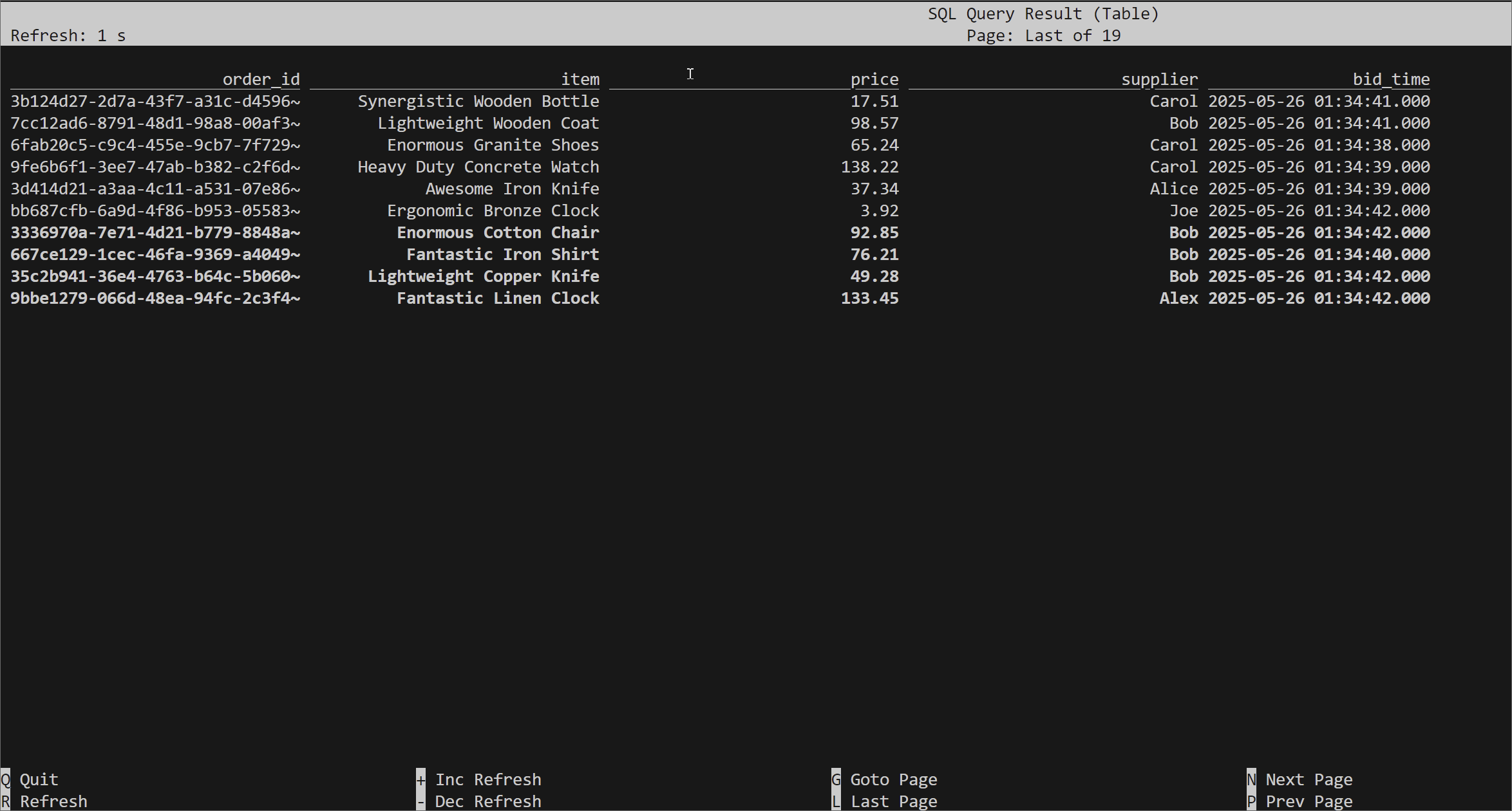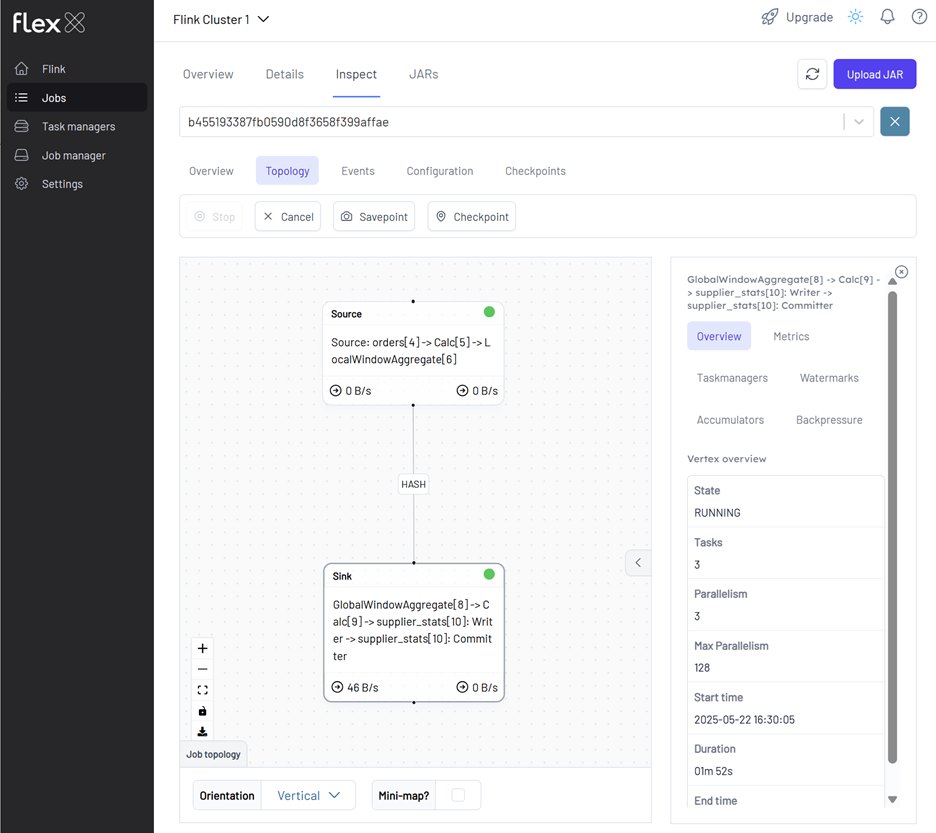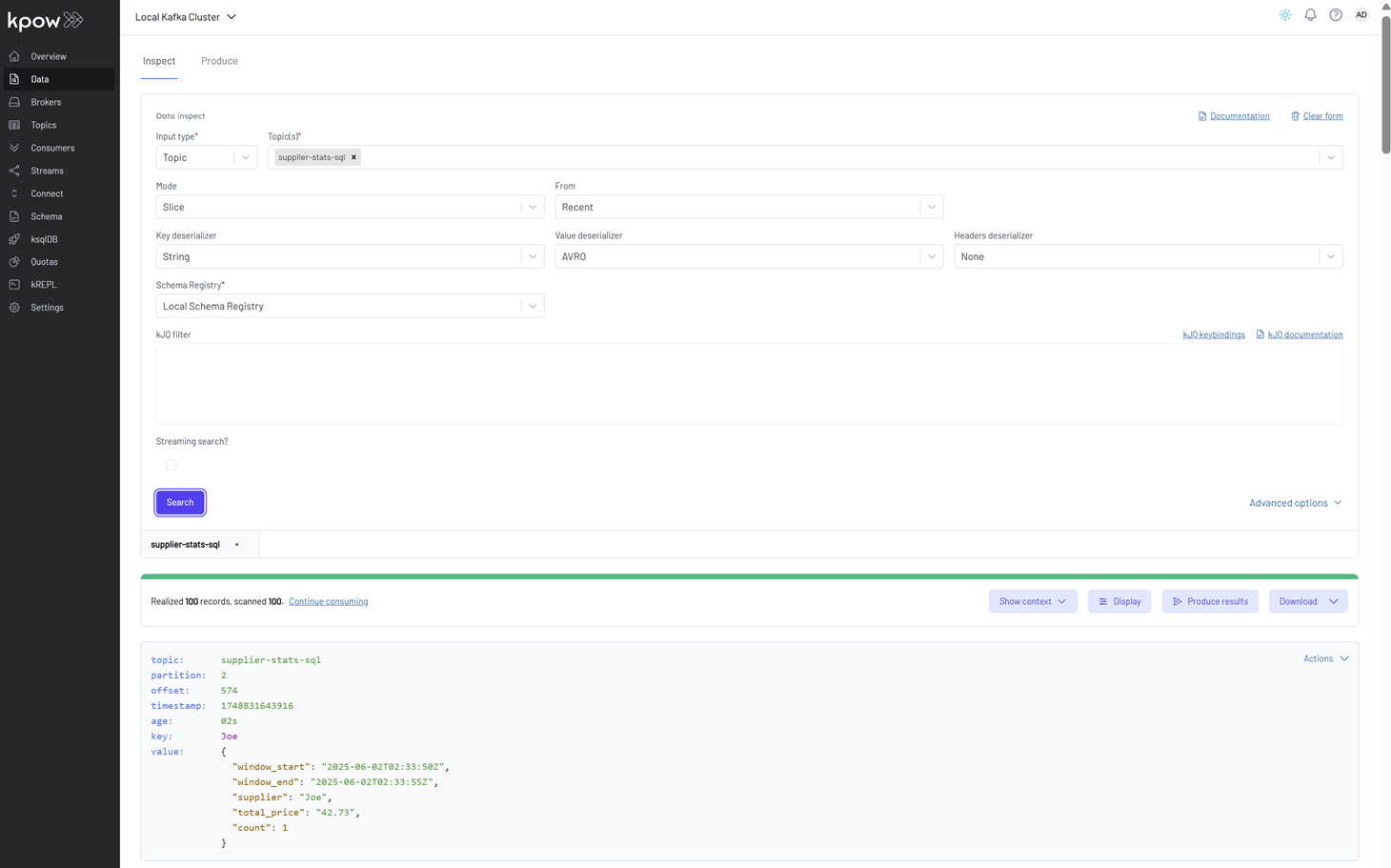Lab 4: Flink SQL - Aggregating Supplier Stats from Kafka Topic
Use Flink SQL to read Avro-encoded orders from Kafka, perform tumbling window aggregations to compute supplier-level metrics, and write results back to Kafka. This lab demonstrates real-time analytics using declarative SQL and Kafka integration.
How to start
Clone project repository
git clone https://github.com/factorhouse/examples.git
cd examples
Start Kafka and Flink environments
We'll use Factor House Local to quickly spin up Kafka and Flink environments that include Kpow and Flex. We can use either the Community or Enterprise editions of Kpow/Flex. To begin, ensure valid licenses are available. For details on how to request and configure a license, refer to this section of the project README.
## Clone the Factor House Local Repository
git clone https://github.com/factorhouse/factorhouse-local.git
## Download Kafka/Flink Connectors and Spark Iceberg Dependencies
./factorhouse-local/resources/setup-env.sh
## Uncomment the sections to enable the edition and license.
# Edition (choose one):
# unset KPOW_SUFFIX # Enterprise
# unset FLEX_SUFFIX # Enterprise
# export KPOW_SUFFIX="-ce" # Community
# export FLEX_SUFFIX="-ce" # Community
# Licenses:
# export KPOW_LICENSE=<path-to-license-file>
# export FLEX_LICENSE=<path-to-license-file>
docker compose -p kpow -f ./factorhouse-local/compose-kpow.yml up -d \
&& docker compose -p flex -f ./factorhouse-local/compose-flex.yml up -d
Deploy source connector
We will create a source connector that generates fake order records to a Kafka topic (orders). See the Kafka Connect via Kpow UI and API lab for details about how to create the connector.
Once deployed, we can check the connector and its tasks in Kpow.

Create pipeline
This example runs in the Flink SQL client, which can be started as shown below.
docker exec -it jobmanager ./bin/sql-client.sh
Load dependent JARs
We begin by loading the necessary JAR files for the Apache Kafka SQL connector and Confluent Avro format support.
ADD JAR 'file:///tmp/connector/flink-sql-connector-kafka-3.3.0-1.20.jar';
ADD JAR 'file:///tmp/connector/flink-sql-avro-confluent-registry-1.20.1.jar';
show jars;
-- +-------------------------------------------------------------+
-- | jars |
-- +-------------------------------------------------------------+
-- | /tmp/connector/flink-sql-connector-kafka-3.3.0-1.20.jar |
-- | /tmp/connector/flink-sql-avro-confluent-registry-1.20.1.jar |
-- +-------------------------------------------------------------+
-- 2 rows in set
Create source table
The source table is defined using the Kafka SQL connector, enabling Flink to consume Avro-encoded messages from the orders Kafka topic. To support time-based processing and windowed aggregations, an event-time watermark is introduced on bid_time using WATERMARK FOR bid_time AS bid_time - INTERVAL '5' SECOND. This watermark allows Flink to track event time progress and handle out-of-order events, which is required for time-based operations such as windowed aggregations or joins.
This setup allows Flink to perform event-time processing over incoming Kafka messages, with schema management handled automatically by the Avro format and Schema Registry.
CREATE TABLE orders (
order_id STRING,
item STRING,
price STRING,
supplier STRING,
bid_time TIMESTAMP(3),
WATERMARK FOR bid_time AS bid_time - INTERVAL '5' SECOND
) WITH (
'connector' = 'kafka',
'topic' = 'orders',
'properties.bootstrap.servers' = 'kafka-1:19092',
'format' = 'avro-confluent',
'avro-confluent.schema-registry.url' = 'http://schema:8081',
'avro-confluent.basic-auth.credentials-source' = 'USER_INFO',
'avro-confluent.basic-auth.user-info' = 'admin:admin',
'avro-confluent.schema-registry.subject' = 'orders-value',
'scan.startup.mode' = 'earliest-offset'
);
Run the following query to view the source table:
select * from orders;

Create sink table
A sink table (supplier_stats) is defined to collect per-supplier statistics computed over tumbling event-time windows of 5 seconds. The table stores:
- The start and end time of each window (as formatted UTC strings),
- The supplier name,
- The total price of all bids within the window, and
- The total number of bids received.
This aggregation is performed using Flink's TUMBLE function, which groups events into fixed-size, non-overlapping time windows based on the bid_time field from the source table. The results of the aggregation query are inserted into the sink table.
The sink is backed by a Kafka topic (orders-supplier-stats) and uses Confluent Avro for both the value serialization. The key is set to the supplier field and uses a fixed partitioner, ensuring that all records for the same supplier are written to the same partition.
There are some important considerations.
- Parallelism: The default parallelism is explicitly set to 3 using
SET 'parallelism.default' = '3'. This value should not exceed the number of partitions in the Kafka topic; otherwise, some parallel tasks will not be able to write data, and no messages will be produced. If in doubt, it's safer to match the parallelism to the number of partitions. - Topic creation: If the Kafka topic
orders-supplier-statsdoes not exist and Kafka is configured withauto.create.topics.enable=true, it will be automatically created with default settings. These typically include 3 partitions and a replication factor of 1 or 3, depending on your broker configuration. - Timestamp formatting: The
window_startandwindow_endfields are formatted using theDATE_FORMAT(..., 'yyyy-MM-dd''T''HH:mm:ss''Z''')pattern to produce ISO 8601-style UTC timestamps (ending with'Z').
This setup allows for real-time supplier metrics to be calculated and streamed out to Kafka, where they can be consumed by other services or analytics platforms.
SET 'parallelism.default' = '3';
CREATE TABLE supplier_stats (
window_start STRING,
window_end STRING,
supplier STRING,
total_price DECIMAL(10, 2),
`count` BIGINT
) WITH (
'connector' = 'kafka',
'topic' = 'supplier-stats-sql',
'properties.bootstrap.servers' = 'kafka-1:19092',
'format' = 'avro-confluent',
'avro-confluent.schema-registry.url' = 'http://schema:8081',
'avro-confluent.basic-auth.credentials-source' = 'USER_INFO',
'avro-confluent.basic-auth.user-info' = 'admin:admin',
'avro-confluent.schema-registry.subject' = 'supplier-stats-sql-value',
'key.format' = 'raw',
'key.fields' = 'supplier',
'value.format' = 'avro-confluent',
'sink.partitioner' = 'fixed',
'sink.parallelism' = '3'
);
INSERT INTO supplier_stats
SELECT
DATE_FORMAT(window_start, 'yyyy-MM-dd''T''HH:mm:ss''Z''') AS window_start,
DATE_FORMAT(window_end, 'yyyy-MM-dd''T''HH:mm:ss''Z''') AS window_end,
supplier,
SUM(CAST(price AS DECIMAL(10, 2))) AS total_price,
count(*) AS `count`
FROM TABLE(
TUMBLE(TABLE orders, DESCRIPTOR(bid_time), INTERVAL '5' SECOND))
GROUP BY window_start, window_end, supplier;
We can monitor the Flink job via the Flink UI (http://localhost:8082) or Flex (http://localhost:3001). The screenshot below shows the job's logical plan as visualized in Flex.

We can also verify that the sink connector registers the supplier-stats-sql-value schema in Kpow (http://localhost:3000).

To explore the supplier statistics, inspect the messages in the supplier-stats-sql Kafka topic. For proper Avro decoding in Kpow, set the Key Deserializer to String, the Value Deserializer to AVRO, and select Local Schema Registry. Then, click the Search button to view the records.

Shutdown environment
Finally, stop and remove the Docker containers.
If you're not already in the project root directory, navigate there first. Then, stop and remove the Docker containers by running:
# Stops the containers and unsets environment variables
docker compose -p flex -f ./factorhouse-local/compose-flex.yml down \
&& docker compose -p kpow -f ./factorhouse-local/compose-kpow.yml down
unset KPOW_SUFFIX FLEX_SUFFIX KPOW_LICENSE FLEX_LICENSE